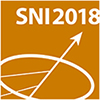Speaker
Description
There are several methods to store hydrogen, e.g. with physical technologies (compression), in metal hydrides or in complex hydrides. Within the complex hydrides, the metal amides Mg(NH2)2-LiH have recently gained in importance. They have good hydrogen storage properties with high capacity (ca. 4 wt%) and good reversibility. The drawback of these materials is the high kinetic barrier for hydrogenation, which results in a long loading time. This can be overcome with the addition of LiBH4, thus, the reaction is faster.
So far Mg(NH2)2-LiH-LiBH4 is an outstanding candidate to be used for hydrogen storage. Interestingly, some compositions can even reach operation temperatures below 100 °C and the desorbed products contain amongst others liquid phases. The hydrogen uptake and release properties of this system are well characterized in terms of capacity, kinetics and phase composition, but the basic mechanism how the reaction takes place and why it has these excellent storage facilities is still unknown. With 6Mg(NH2)/9LiH/LiBH4 we want to understand the system and the reaction mechanism.
We will present first data of neutron scattering experiment using quasielastic scattering at TOFTOF to study hydrogen diffusion of the desorbed and absorbed state, as well as small angle neutron scattering to study particle sizes to gain further insight on the hydrogenation/dehydrogenation mechanism.

